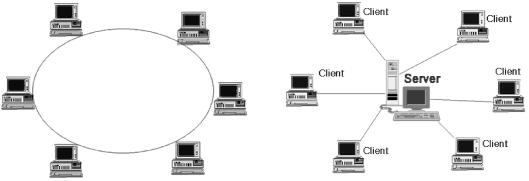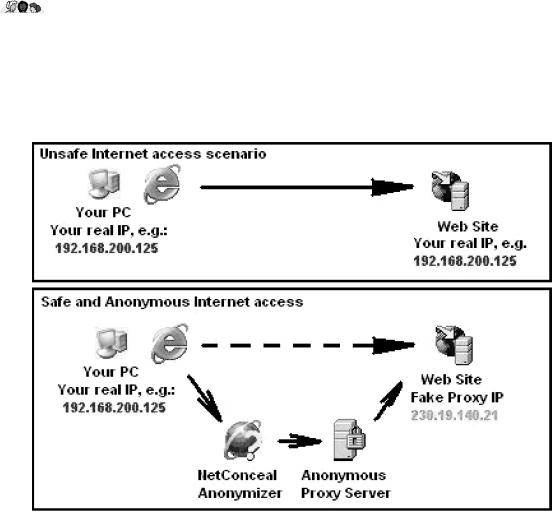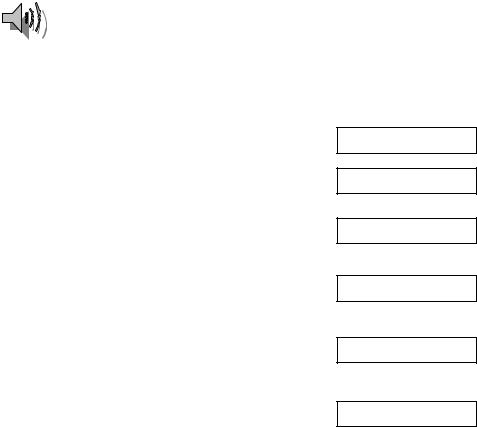
IT_book
.pdf
SPEAKING
6.Discuss the advantages and disadvantages of two types of computer networks: peer-to-peer (A) and client/server (B).
A B
 WRITING
WRITING
7. Translate the following text into Russian.
The Internet is formed by connecting local networks through special computers in each network known as gateways. Gateway interconnections are made through various communication paths, including telephone lines, optical fibers, and radio links. Additional networks can be added by linking to new gateways. Information to be delivered to a remote machine is tagged with the computerized address of that particular machine. Once addressed, the information leaves its home network through a gateway. It is routed from gateway to gateway until it reaches the local network containing the destination machine. Internets have no central control, that is, no single computer directs the flow of information. This differentiates internets from other types of online computer services, such as CompuServe, America Online, and the Microsoft Network.
(http://www.ideafinder.com/history/inventions/internet.htm)
8. Write at least 5 sentences in answer to the following question:
What type of switching technology is used for delivering a letter by the postal service?
Try to imagine what will happen if the road, that is usually used for delivering letters, is under repair.
21
UNIT 2
INTERNET PRIVACY
SECTION 1
LEAD-IN
1.Discuss the following questions.
-Do you know the IP address of your computer? How could you find it?
-What are common ways of connecting to (accessing) the Internet?
 READING
READING
2. Read the text and give a definition of an IP address.
IP ADDRESSES
Each computer on the Internet has a unique numerical address, called an Internet Protocol (IP) address, used to route packets to it across the Internet.
Just as your postal address enables the postal system to send mail to your house from anywhere around the world, your computer's IP address gives the Internet routing protocols the unique information they need to route packets of information to your desktop from anywhere across the Internet. If a machine needs to contact another by a domain name, it first looks up the corresponding IP address with the domain name service. The IP address is the geographical descriptor of the virtual world, and the addresses of both source and destination systems are stored in the header of every packet that flows across the Internet.
You can find your IP address on a Windows computer by opening an MSDOS or Command window and typing one of "winipcfg" or "ipconfig". You can find your IP address on a Mac computer by checking your Network control panel.
As described in the pages on confidentiality and privacy, Internet sites can and do track your IP address and other information. If you want to block or disguise your IP address, you can use an anonymizer.
An IP address is made up of four bytes of information (totaling 32 bits) expressed as four numbers between 0 and 255 shown separated by periods. For example, your computer's IP address might be 238.17.159.4, which is shown below in human-readable decimal form and in the binary form used on the Internet.
22

Example IP Address
Decimal: 238 . 17 . 159 . 4
Binary: 11101110 00010001 10011111 00000100
The Internet Assigned Numbers Authority (IANA) manages the allocation of IP addresses to different organizations in various sized blocks. Most of the address blocks have been allocated to research, education, government, corporations, and Internet Service Providers (ISPs), who in turn assign them to the individual computers under their control.
If you connect to the Internet over a phone line, then your IP address is probably assigned dynamically by your Internet service provider from an available pool of addresses each time you log on. If your computer is permanently connected to an Internet network, such as at the office or on a high speed home connection, then your IP address could be permanently assigned, or could be reassigned each time you reboot your computer. (from www.livinginternet.com)
3.Decide whether the statements below are True or False according to the text.
1.The IP address is the same as postal address.
2.Internet sites follow and control IP addresses.
3.An anonymizer is used to hide your IP address.
4.There are a lot of organizations managing the allocation of IP addresses.
5.All IP addresses are allocated to ISPs.
6.ISPs have got a variety of IP addresses for users connected to the Internet over a phone line.
4. Complete the following sentences with no more than 2 words from the text.
1.The IP address shows the geographical position of the computer in the
_______________.
2.In human-readable decimal form the IP address consists of
____________________.
3.______________ are assigned under ISPs control.
4.When you ___________ the computer your IP address can be reassigned.
23

VOCABULARY AND GRAMMAR
5. Choose the most suitable word or phrase underlined in each sentence.
1.An IP address refers to a unique number appointed/assigned to each computer on the Internet.
2.If you set your web browser start page to an anonymizer/anonymous site, then every subsequent web access you make from that page will also be anonymized.
3.A static IP address is a permanent address, while a (an) active/dynamic address changes with each new Internet session.
4.Though the Internet might feel anonymous, it is not an anonymous environment by default/on default.
5.You can set your browser to refuse/reject cookies.
6.Sites that provide anonymous surfing/penetration keep the user's IP address hidden from the Internet.
7.The solution of establishing a secure communication is a (an) encryption/decryption method called Public Key Cryptography (PKC).
6. Decide which answer A, B, C or D best fits each space.
How Anonymizers Work
Anonymizer sites access the Internet on your behalf, protecting your personal information from 1) __________________. An anonymizer 2)
________________all of your computer's identifying information while it surfs for you, enabling you to remain at least one step removed from the sites you visit. There are two basic types of Internet anonymizers – networked and singlepoint.
Network anonymizers 3) _____________your communications through a network of Internet computers between you and the destination. The main advantage of the networked anonymizer 4) _________ is that it makes traffic analysis much more difficult.
Single-point anonymizers pass your surfing through a single web site to protect your identity, and often offers an encrypted 5) ______________channel for passage of results back to the user.
Single-point anonymizers offer less 6) ___________ to sophisticated traffic analysis than do networked designs.
24
Both networked and single-point anonymizers share a range of design 7) __________. Most importantly, once you access a web page through an anonymizer, the page is 8) ______________so that all of its links are also anonymized. Therefore, you can just continue to click on links and stay in the anonymizer mode. (from www.livinginternet.com)
1. |
A) find |
B) disclosure |
C) discovery |
D) identity |
2. |
A) protects |
B) helps |
C) holds |
D) grasps |
3. |
A) put |
B) accompany |
C) relate |
D) transfer |
4. |
A) volume |
B) design |
C) size |
D) capacity |
5. |
A) coordina- |
B) frequency |
C) communica- |
D) coopera- |
|
tion |
|
tions |
tion |
6. |
A) help |
B) modification |
C) resistance |
D) opposition |
7. |
A) qualities |
B) kinds |
C) sorts |
D) features |
8. |
A) sorted |
B) reflected |
C) formulated |
D) filtered |
WORD FORMATION
We have already seen how prefixes change the meaning of a word. Let us now consider some suffixes and how they change the meaning of English words.
|
|
SUFFIXES |
|
|
|
|
|
|
|
Nouns |
Verbs |
|
Adjectives |
Adverbs |
-ance |
-ize |
|
-able |
-ly |
-ence |
-ate |
|
-ible |
|
-or |
-fy |
|
-ful |
|
-er |
-en |
|
-less |
|
-ist |
-ify |
|
-ic |
|
-ness |
|
|
-ical |
|
-ian |
|
|
-ish |
|
-tion, -ation, -ion |
|
|
-ive |
|
-ity |
|
|
-ous |
|
-ism |
|
|
-ed |
|
-dom |
|
|
|
|
-ship |
|
|
|
|
25
E. g. |
E. g. |
E. g. |
E. g. |
performance, pro- |
computerize, |
computational, |
electronically, |
grammer, analyst, |
activate, calculate, |
circular, automa- |
logically, compa- |
compilation, con- |
simplify, harden, |
tic, comparable, |
rably |
version, mea- |
widen |
divisible, yellow- |
|
surement, mag- |
|
ish, interactive, |
|
netism, freedom, |
|
computed |
|
partnership |
|
|
|
7.Read the following sentences and circle the suffixes. Translate the sentences.
1.Anonymous P2P is desirable and in some cases necessary to ensure freedom of speech and the free flow of information.
2.A sufficiently detailed protocol includes details about data structures and representations, at which point it can be used to implement multiple, interoperable versions of a program.
3.A cryptographic protocol has an entity authentication mechanism, based on the X.509 system.
4.A wide variety of cryptographic protocols go beyond the traditional goals of data confidentiality, integrity, and authentication to also secure a variety of other desired characteristics of computer-mediated collaboration.
8. Fill in the table by forming nouns and adjectives from the verbs below.
|
Concrete |
Abstract |
Verb |
Adjective |
e.g. |
noun |
noun |
|
|
calculator |
calculation |
to calculate |
calculating |
|
1. |
|
|
to compute |
|
2. |
|
|
to multiply |
|
3. |
|
|
to analyse |
|
4. |
|
|
to summarise |
|
5. |
|
|
to replace |
|
6. |
|
|
to discover |
|
7. |
|
|
to protect |
|
8. |
|
|
to operate |
|
9. |
|
|
to create |
|
10. |
|
|
to refer |
|
26

 SPEAKING
SPEAKING
9. Describe two situations showed at pictures. Then answer the following questions:
Have you ever used anonymizers?
Is it a trustworthy tool for hiding your privacy?
10.There are different opinions on online anonymity. Decide which group of debaters you belong to and express your views on the following question:
Is anonymity on the Internet a good or a bad thing?
SUPPORTERS |
OPPONENTS |
Personal information about the users |
Anonymity enables or encourages il- |
can be harmful for them and used by |
legal or dangerous activity (e.g., ter- |
criminals. People have right to hide |
rorism, drug trafficking, sexual ap- |
their identities |
proaches towards minors, and so on) |
|
|
27

11.Work in pairs. Discuss the following issues about the cookies.
Does the cookie technology violate the user’s right to privacy?
Does the use of information filters violate the principle of free speech?
12.Work in groups and discuss such topic as Internet scandals.
The Web is a great way to deliver information, but it's also a great way to expose, spread, or jump-start a scandal. What Internet scandals do you know? How did they affect people’s lives? What is your opinion to this problem?
LISTENING
13. You are going to listen to a magazine article about the influence of cookies on Internet security. For questions 1–6 fill in the relevant information.
You can get a cookie during …
In business cookies can help …
The cookies deposited on your system help the host server understand if …
Cookies cannot hurt your computer because they are …
Cookies cannot access information on your …
By choosing proper settings you can always …
1
2
3
4
5
6
28
 WRITING
WRITING
14. Read the text and write an annotation. Use the following clichés:
The text (article) under review … gives us a sort of information about … The article deals with the problem …
The subject of the text is …
At the beginning (of the text) the author describes (dwells on, explains, touches upon, analyses, comments, characterizes, underlines, reveals, gives account of)
…
The article begins with the description of (a review of, the analysis of) … The article opens with …
Then (after that, further on, next) the author passes on to (gives a detailed analysis, goes on to say that) …
To finish with, the author describes …
At the end of the article the author draws the conclusion that (sums up by saying) …
In conclusion the author …
SNEAKY WAYS TO GET AROUND
THOSE INTERNET PRIVACY ISSUES
It is nearly impossible to maintain privacy online. Users may be giving out personal information, including e-mail addresses and contact information, without knowing it. There are many ways for users privacy to be violated online. However, there are some ways to avoid these privacy issues, and to get around them. Properly configuring the Web browser is one way to ensure that privacy is not invaded. In the browsers Setup, Options, or Preferences menus users have the option of using a pseudonym instead of their real names; users may also withhold their e-mail address, and other personally identifiable information. It is also advisable to turn on cookie notices in the Web browser, and use cookie management software. There are many cookies that can be used for data mining purposes to track how much time a user spends on a specific Web site, what links are clicked on, and other details a company would record for marketing purposes.
If a user is mailing to an unknown party, posting to a newsgroup, mailing lists, chat rooms, and other public spaces on the Internet that mentions their e- mail address, the users should use a pseudonymous or alternate e-mail address.
29
Users should only use their main e-mail address on small, members-only lists, and with individuals they trust. Free e-mail service providers, such as Yahoo and Hotmail are best for creating a side e-mail account. Users should never give their personal details to strangers or other users they just met. It is important for users to realize that they can’t trust any person that is asking for their personal information online. There is a lot of personal information users may prefer to withhold until they meet the other person, which includes their full name, place of employment, phone number, and street address. (from www.internet-security- abc.com)
INTERNET ACTIVITIES
15. You are going to carry out a research on the Internet.
If you spend any amount of time surfing the Web, you've probably come across the term "net neutrality." But what is it, and why is it stirring up controversy in Congress, the business world and the blogosphere? The net neutrality debate is divided into two camps: Fighting against net neutrality are the telecom companies and cable providers, who provide Internet access to consumers. Opposing them are content providers like Google, Amazon, and non-profits like MoveOn.org and the National Religious Broadcasters. But what are they fighting about?
You should surf the web and do the following tasks:
Define the term “net neutrality”. (use any search engine)
Understand what the two opposing camps are fighting for. (You may visit
the following links: www.HandsOff.org which is in favour of the telecoms and www.SavetheInternet.com which is in favour of Net Neutrality.
Then discuss in groups your opinions on this problem. Which side do you take?
SECTION 2
 READING
READING
1. Read the text and translate it.
PRIVACY WHILE BROWSING THE WEB
When you surf the web your browser sends out information about your browser, system and internet connection. This information is called HTTP Headers that can contain information that is commonly used by marketers and statistical analysis programs.
30
